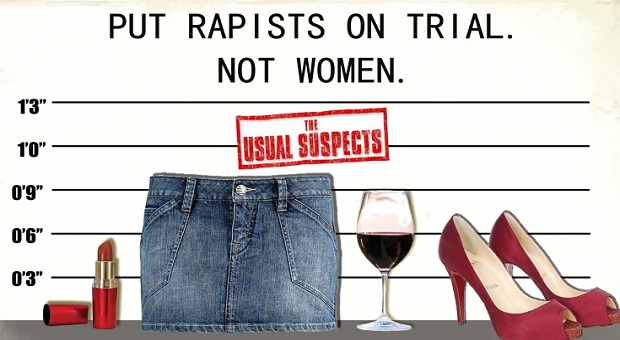A few months ago, I woke up to some ignorant, ridiculous opinions on Twitter. Certain individuals were trying to argue that if women were fully clothed, stopped going to bars and pubs and began “acting like women”, rape and other acts of violence against women would stop. These individuals argued that if a woman dresses in a certain way and hangs out at pubs with friends, she is inviting violence and provoking men to rape or violate her in some other way.
After the incident in Guwahati, (in India’s Northeast) where a girl was molested in public, outside of a pub by fifteen men while onlookers ignored her cries for help, I’ve come across more of these uninformed, ridiculous opinions. It’s one thing when you see it in a Tamil movie—who really expects an unbiased take on reality from one of them? But when you see the average person arguing that it’s the victim’s fault, it’s hard to wrap your mind around.
Why are people so quick to blame the victim? As if wearing certain clothes, going to pubs and having a good time with your friends, provokes perverts and invites violence and sexual abuse. As if committing an act of violence upon another human being does not involve making the decision to do so by the perpetrator of the crime.
Violence against women is NOT invited. And while my focus in this article are prevalent views about the abuse of women in South Asian culture, I want to make it clear that violence against men is equally unjust. No one is asking to be raped or abused.
Violent acts against women happen everywhere; it happens in the East and it happens in the West. Not only women, but young girls and infants are abused every single day. Children are trafficked and sold into slavery and forced prostitution. I highly doubt they were going to pubs and dressing provocatively. So, to the ignorant individuals out there, why do they get abused?
The answer to this lies in the minds of the rapists and abusers that commit these atrocious crimes. We need to stop blaming and finding faults with the victim and providing excuses for the perpetrators and those who enable these acts.
As for the people who believe that women should “act like women”, what does that even mean? Should we cover up and stay at home? Or just wait for the men in our lives to tell us what to do? Today, more than ever before, woman play a wide range of diverse roles in their homes and in their workplaces. Regardless of common ways that we identify ourselves, like being Tamil for instance, all women are different and trying to define or label us with stereotypes just doesn’t make sense.
Fortunately, in spite of the amount of ignorance on this topic, I also came across those who were outraged by individuals who insist on blaming victims.
@juhipande tweeted, “Sexual assault is a criminal offense. Choosing to dress in whatever manner is a personal choice. The two are not connected.”
Vishal Dadlani tweeted, “What a woman wears is HER choice! Not yours! Women in salwar-suits/burqas have been raped too! MEN need to stop being ANIMALS!”
Indian MP, Prabha Thakur also responded by saying “the question is not about the dress code, but the mentality of men. What girls should wear should be the concern of the girl, her parents and her family only. I don’t think there is a need for anyone else to say anything about how a girl should behave.”
In response to the incident in Guwahati, Meena Kandasamy wrote “The really Good Indian Man is… every Indian man who thinks that women who go to pubs deserve to be treated in this manner, completely and wantonly oblivious to the fact that women who use public transport face a similar ordeal each day; or maybe he is every Indian brother who tells his sister to cover up her cleavage and not invite attention with her stylish clothes, or maybe he is every Indian man who thinks that feminists are loud-mouthed man-hating bitches and that these six hundred words were written by a shameless stupid hoe who does not know that being a Good Indian Woman demands sacrifice and silence and suffering.”
Meena later tweeted, “blaming clothes for molestation seeks to erase the experience of sexual violation and assault faced by women who wear traditional clothes.”
Salil Tripathi, of livemint.com, says “there’s a simpler solution: blindfold and restrain the men who can’t see women going where they want to go, wearing what they want to wear, doing what they want to do.”
Image courtesy of the Urban Women’s Anti-Violence Strategy Prevention of Violence Against Women Week.
The views expressed in this article are those of the author and do not necessarily reflect TamilCulture’s editorial policy.

 Shiromi
Shiromi








